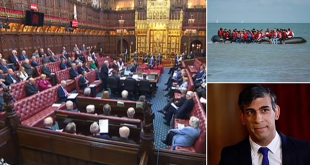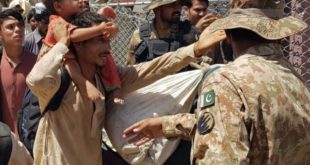7,400 Afghans return daily from Pakistan; 4,350 children screened for malnutrition; Afghanistan to receive 1.5 million returnees by March 15, 2017; UNHCR needs additional $2.1 million in the medium-term
AT Monitoring Desk-KABUL: The United Nations High Commissioner for Refugees (UNHCR) and the International Organization for Migration (IOM) warned of escalating humanitarian crisis in Afghanistan as daily 7,400 Afghans return to homeland from Pakistan.
After extending the repatriation deadline, Afghan refugees can stay until 15 March 2017 in Pakistan.
UNHCR and IOM estimate that Afghanistan would receive between one and 1.5 million returnees by March 15, 2017 when combined with the internally displaced persons (IDPs).
“While the deadline has been long-known, the Pakistani government is generating pressure to speed up the return process due to a change in political dynamics between Pakistan and Afghanistan. This includes an increase in the spread of terrorism, presence of Daesh in both countries, and deepening ties between Afghanistan and India,” the UN said.
The Office for the Coordination of Humanitarian Affairs (OCHA) issued Afghanistan Humanitarian Situation Report 3 the other day, which points out that 60 percent of those returning are children. As many as 80,000 are under the age of five and require health and nutritional support on emergency basis.
According to the OCHA’s report, 4,350 returnee children were screened for malnutrition, with 160 cases of severe acute malnutrition (SAM) and moderate acute malnutrition (MAM) referred to health centers for treatment. At least 5,848 children under 10 years of age received oral polio vaccine. (OPV). Around 630 vulnerable families were assisted with hygiene kits.
Afghan government response in emergencies is coordinated by the Afghanistan National Disaster Management Authority (ANDMA) and, in some cases, with the Ministry of Rural Rehabilitation and Development (MRRD) at the national and provincial levels. Afghanistan established its cluster system in 2008, with six clusters: emergency shelter and non-food items; food security and agriculture; health; nutrition; water and sanitation; protection and its five sub clusters in child protection in emergencies, gender-based violence, land and property task force, mine action and internally displaced persons (IDP) task force. Inter-cluster coordination takes place at the national level to implement the response. An InterCluster Coordination team, headed by OCHA, comprises all clusters, sub-clusters and NGO co-lead representatives, in addition to UNHCR and the Gender in Humanitarian Action Task Force. The Afghanistan Flash Appeal (September – December 2016), launched in September 2016, aims to ensure a dignified and efficient reception of returnees; registration, profiling, and support at the border; the provision of immediate assistance for the most vulnerable; creation of a safe environment and ensure access to food, basic services like health, a safe and adequate shelter; identification and prioritization of those for immediate humanitarian response i.e. the most vulnerable and the areas of Kabul and Jalalabad where they will be resettled. At the Torkham crossing point, the Ministry of Refugee and Repatriation (MoRR) leads the referral and registration of incoming returnees to both the IOM Transit Centre (for the undocumented) and the UNHCR Encashment Centre (for the documented).
“UNHCR and the UN Office for the Coordination of Humanitarian Affairs (OCHA) are currently overseeing a humanitarian strategy that involves 160 national and international non-governmental organization partners in addition to the UN, IOM, Red Crescent and Red Cross Societies. OCHA is conducting a joint needs assessment that focuses especially on nine districts that have been identified as high return areas,” the UN news center said.
UNICEF is providing necessary food supplements and teaching materials to people at Torkham and Chaman crossing points. According to UNICEF, it is focusing on nutrition, health, and education, providing vitamins, vaccinations, psychological care at the crossing points and regions experiencing a high influx of returnees. “The agency is also working closely with IOM to ensure that water, sanitation and hygiene needs are met and is collecting feedback on returnee’s needs at key entry and transit points. Messages about immunization, health, nutrition, handwashing, education, child protection, and birth registration have been distributed to the returnees,” the UN said.
OCHA’s report identifies the eastern region of Afghanistan including Nangarhar, Laghman, Kunar and Nuristan provinces as the highest risk areas for IED incidents, kidnapping and sudden armed clashes among government forces, armed tribal groups, and Taliban insurgents. As Daesh is active in eastern provinces of the country, especially Nangarhar, UNICEF and other agencies conducted a security assessment mission earlier this month to enable road missions to the Torkham and nearby districts experiencing a high rate of returnees.
UNICEF Afghanistan has met the initial short-term three-month funding period to respond to the humanitarian crisis, but will need an additional $2.1 million in the medium-term. The next Situation Report is anticipated for 19 October 2016 and a summary of the program results will be adjusted to reflect sector-specific needs assessments by 15 October 2016.
 Afghanistan Times
Afghanistan Times




